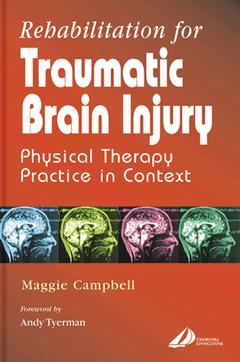Description
Rehabilitation for Traumatic Brain Injury
Rehabilitation for Traumatic Brain Injury
Author: Campbell Maggie
Language: English
Subject for Rehabilitation for Traumatic Brain Injury:
Publication date: 08-2000
272 p. · Hardback
272 p. · Hardback
Description
/li>Contents
/li>Readership
/li>
Rehabilitation for Traumatic Brain Injury helps the reader develop a deeper understanding of the pathology and effects of any significant traumatic insult to the brain. This understanding is essential for all of those contributing to the lengthy process of rehabilitation following traumatic brain injury.
Physiotherapists have a key role to play in this process, which continues long after patients are discharged from acute care provision. Therapists may encounter traumatic brain injury survivors in neuro-rehabilitation units, non-specialist wards, outpatient departments or in the community.
This book will provide all those involved in such service provision with an understanding of the importance of their role in the ongoing rehabilitation process. Those reading the book will find it increases their knowledge and understanding of the problems faced by affected patients and their families. It will also help them to define their own role as therapists, whether working in hospital or in the community, within the lengthy and ongoing rehabilitation process.Defines the role of the therapist within the rehabilitation team Stresses the need to understand the ongoing nature of rehabilitation beyond the acute care phaseHighlights the impact upon the clients and their families of the non-physical and often less obvious deficits resulting from brain injury Provides a source of ideas for more effective rehabilitation managementRaises issues to stimulate wider debate
Physiotherapists have a key role to play in this process, which continues long after patients are discharged from acute care provision. Therapists may encounter traumatic brain injury survivors in neuro-rehabilitation units, non-specialist wards, outpatient departments or in the community.
This book will provide all those involved in such service provision with an understanding of the importance of their role in the ongoing rehabilitation process. Those reading the book will find it increases their knowledge and understanding of the problems faced by affected patients and their families. It will also help them to define their own role as therapists, whether working in hospital or in the community, within the lengthy and ongoing rehabilitation process.
Abbreviations. About This Book. Section 1: Setting the Context. Understanding Traumatic Brain Injury. Understanding the Impact of the Traumatic Event and the Influence of Life Context. Section 2: The Assessment Process. Initial Considerations in the Process of Assessment. Understanding and Contributing to the Global Assessment. Sensorimotor Assessment. Defining Goals for Intervention. Section 3. Designing Interventions. Applying Neurophysiotherapeutic Principles. Cognitive, Behavioural and Individual Influences in Programme Design. Section 4: Service Provision. Policy, Planning and Proactive Management. Index.
Physiotherapists students and qualified, Occupational therapists, Community nurses, Social workers
© 2024 LAVOISIER S.A.S.




